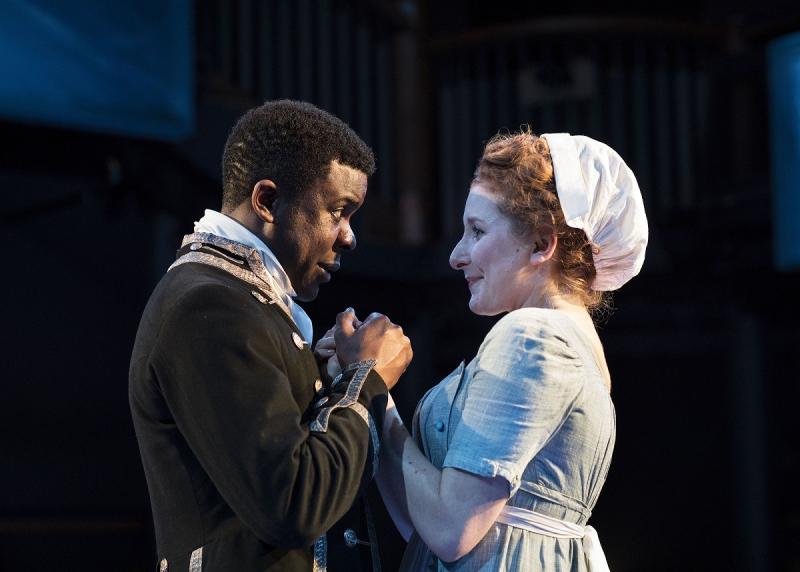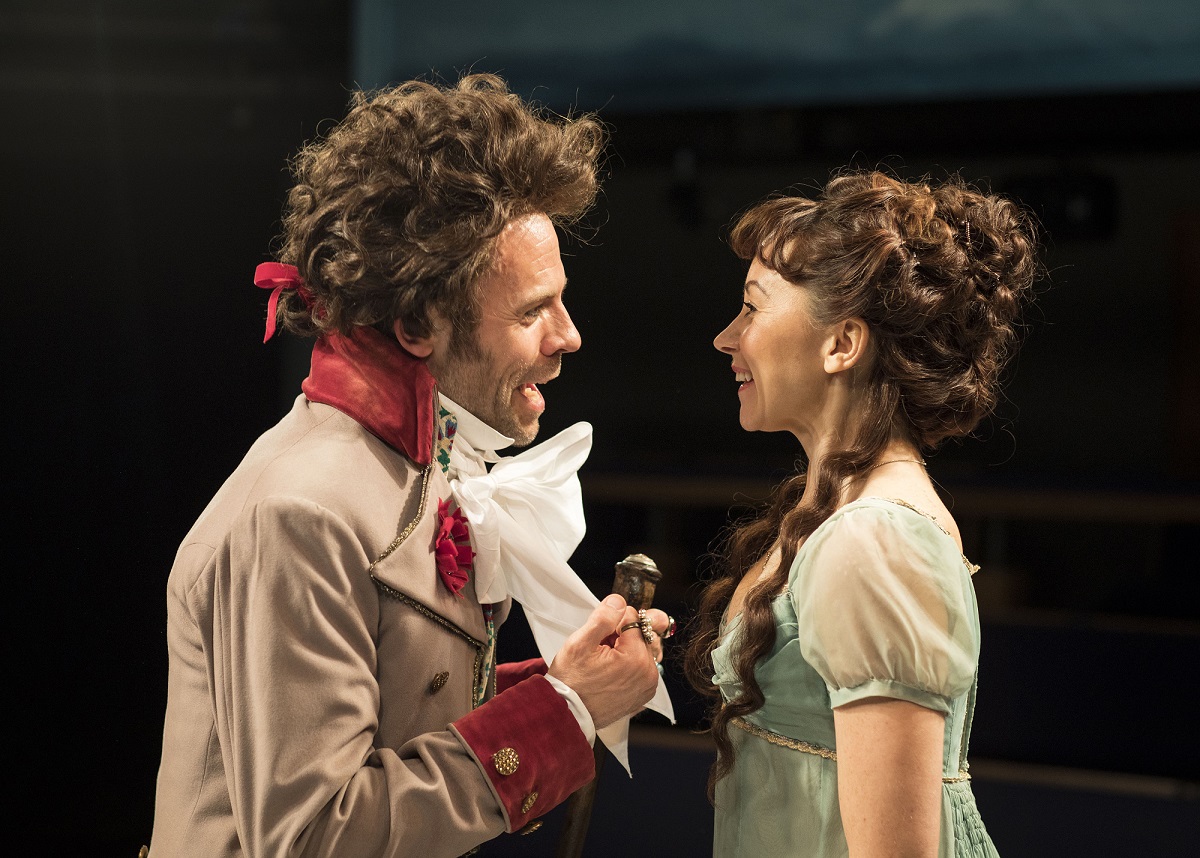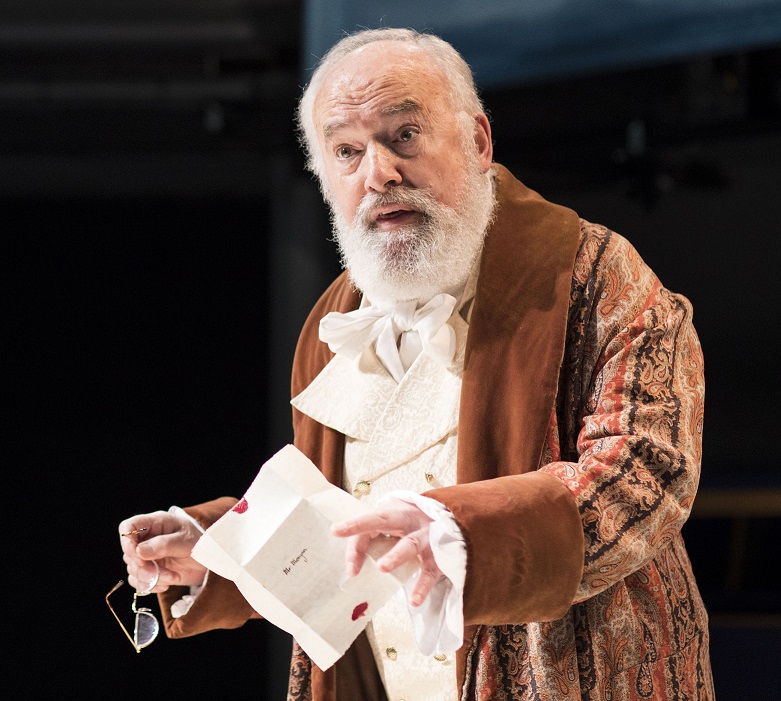The Lottery of Love, Orange Tree Theatre review - the fragile charm of artifice | reviews, news & interviews
The Lottery of Love, Orange Tree Theatre review - the fragile charm of artifice
The Lottery of Love, Orange Tree Theatre review - the fragile charm of artifice
Marivaux via John Fowles, through the prism of Jane Austen

The social permutations of love are beguilingly explored in the 90-minute stage traffic of Marivaux’s The Lottery of Love, with Paul Miller’s production at the Orange Tree Theatre making the most of the venue’s unencumbered in-the-round space to dance the action along at a brisk pace. The only adornment in Simon Daw’s design is an elaborate chandelier, bedecked with candles and hanging roses, but the sheer élan of the piece more than occupies the stage in itself.
The theatre's Richmond location couldn’t be better either, the Georgian villas around its Green and along the Thames just the kind of setting in which the protagonists of this adaptation would have been at home. This production of the French dramatist’s 1730 play comes in the translation by John Fowles – a fruit of the novelist’s collaboration with Peter Hall at the National in the early 1980s, it apparently only received a workshop production there, so this outing is billed as a premiere – which brings the action forward by a century to Regency England.
The impersonation will allow her to appraise her would-be partner at one remove
For Fowles, the attractions of the later period were intricately linked to one of its luminaries, Jane Austen: he wrote about “the hoops of self-learning that Marivaux constantly puts his women through”, specifically comparing the play’s heroine Sylvia with the earlier novelist’s Emma Woodhouse. The change of setting surely adds depth: Marivaux’s original, titled Le Jeu de l’amour et du hazard, was rooted in the commédie Italienne of its times, but here we sense more keenly the dilemma of a young woman seeking to direct her own world, one in which if marriage does not work on an emotional level, all the appurtenances of wealth and rank will be as nothing.
That said, The Lottery of Love offers a style of courting ritual you would not expect to find, say, at Pemberley. Sylvia (Dorothea Myer-Bennett, lovely in the depths of character she spins out through the piece) has been offered a potentially suitable match by her father, and the arrival of Richard (Ashley Zhangazha), son of an old family friend, heralds their first meeting. But it’s clear from the start that the choice will be Sylvia’s alone, and to give herself greater independence in that process she decides to exchange places with her maid Louisa (Claire Lams). The impersonation, she hopes, will allow her to appraise her would-be partner at one remove. When that plan receives her father’s blessing, all seems set for a simple mistress-maidservant role reversal. Little do the ladies know, however, that Richard has come up with a similar ruse. His father has informed her father of the plan and we, the audience, are in cahoots, the stage set for an elaborate dance of characters being tested by repeating situations in which they are only aware of one level of the truth, while our complicity enhances the dramatic delight of the deceit.
When that plan receives her father’s blessing, all seems set for a simple mistress-maidservant role reversal. Little do the ladies know, however, that Richard has come up with a similar ruse. His father has informed her father of the plan and we, the audience, are in cahoots, the stage set for an elaborate dance of characters being tested by repeating situations in which they are only aware of one level of the truth, while our complicity enhances the dramatic delight of the deceit.
As Sylvia and Richard discover a mutual attraction, they become increasinlgy uneasy that such feelings are contrary to their own (and society's) expectations. The servant-servant interaction proves more fluid, helped by the ease with which Richard’s servant Brass (Keir Charles, enjoying a riot of a role) assumes a delightedly dandyish role, the exaggerated foppery of which absorbs the manners of his natural servant origins. In this rampant class crossover, Louisa proves cunningly adept at mimicking the manners of her mistress, too. (Pictured above: Keir Charles, Claire Lams)
 The play-off of such layers of knowledge, and self-knowledge, comes thick and fast. Never more so than when Marivaux adds a further final-act dimension of deception, allowing Sylvia, who by now is in the know, to test Richard’s feelings one last time. It’s carried off with such gusto that whatever genuine confusions may have arisen by this point are somehow forgotten. And something deeper runs beneath it all, too. Whether Fowles’s version adds an additional English note or not, it's hard not to recall the dramatic resolutions of Shakespeare's great comedies, involving as they do disguises of gender (Myer-Bennett’s line here, “I would love you if I could”, is one she has also uttered as As You Like It’s Rosalind).
The play-off of such layers of knowledge, and self-knowledge, comes thick and fast. Never more so than when Marivaux adds a further final-act dimension of deception, allowing Sylvia, who by now is in the know, to test Richard’s feelings one last time. It’s carried off with such gusto that whatever genuine confusions may have arisen by this point are somehow forgotten. And something deeper runs beneath it all, too. Whether Fowles’s version adds an additional English note or not, it's hard not to recall the dramatic resolutions of Shakespeare's great comedies, involving as they do disguises of gender (Myer-Bennett’s line here, “I would love you if I could”, is one she has also uttered as As You Like It’s Rosalind).
The ensemble playing already has considerable verve, and will surely gain extra finesse as the run continues. The two female roles may be its highlights, but Pip Donaghy (pictured above) in the smaller role of the father is especially good, enjoying all this confusion with a knowing benignity (Fowles had wondered if Marivaux was allowing himself an element of self-portrait in the character). He finds just the right lightness to convey The Lottery of Love’s fragile charm, the elusive collusion between players and audience that allows us to be simultaneously caught up in its action, even as we are aware of its airy artifice.
rating
Share this article
The future of Arts Journalism
You can stop theartsdesk.com closing!
We urgently need financing to survive. Our fundraising drive has thus far raised £49,000 but we need to reach £100,000 or we will be forced to close. Please contribute here: https://gofund.me/c3f6033d
And if you can forward this information to anyone who might assist, we’d be grateful.

Subscribe to theartsdesk.com
Thank you for continuing to read our work on theartsdesk.com. For unlimited access to every article in its entirety, including our archive of more than 15,000 pieces, we're asking for £5 per month or £40 per year. We feel it's a very good deal, and hope you do too.
To take a subscription now simply click here.
And if you're looking for that extra gift for a friend or family member, why not treat them to a theartsdesk.com gift subscription?
more Theatre
 Bacchae, National Theatre review - cheeky, uneven version of Euripides' tragedy
Indhu Rubasingham's tenure gets off to a bold, comic start
Bacchae, National Theatre review - cheeky, uneven version of Euripides' tragedy
Indhu Rubasingham's tenure gets off to a bold, comic start
 The Harder They Come, Stratford East review - still packs a punch, half a century on
Natey Jones and Madeline Charlemagne lead a perfectly realised adaptation of the seminal movie
The Harder They Come, Stratford East review - still packs a punch, half a century on
Natey Jones and Madeline Charlemagne lead a perfectly realised adaptation of the seminal movie
 The Weir, Harold Pinter Theatre review - evasive fantasy, bleak truth and possible community
Three outstanding performances in Conor McPherson’s atmospheric five-hander
The Weir, Harold Pinter Theatre review - evasive fantasy, bleak truth and possible community
Three outstanding performances in Conor McPherson’s atmospheric five-hander
 Dracula, Lyric Hammersmith review - hit-and-miss recasting of the familiar story as feminist diatribe
Morgan Lloyd Malcolm's version puts Mina Harkness centre-stage
Dracula, Lyric Hammersmith review - hit-and-miss recasting of the familiar story as feminist diatribe
Morgan Lloyd Malcolm's version puts Mina Harkness centre-stage
 The Code, Southwark Playhouse Elephant review - superbly cast, resonant play about the price of fame in Hollywood
Tracie Bennett is outstanding as a ribald, riotous Tallulah Bankhead
The Code, Southwark Playhouse Elephant review - superbly cast, resonant play about the price of fame in Hollywood
Tracie Bennett is outstanding as a ribald, riotous Tallulah Bankhead
 Reunion, Kiln Theatre review - a stormy night in every sense
Beautifully acted, but desperately grim drama
Reunion, Kiln Theatre review - a stormy night in every sense
Beautifully acted, but desperately grim drama
 The Lady from the Sea, Bridge Theatre review - flashes of brilliance
Simon Stone refashions Ibsen in his own high-octane image
The Lady from the Sea, Bridge Theatre review - flashes of brilliance
Simon Stone refashions Ibsen in his own high-octane image
 Romans: A Novel, Almeida Theatre review - a uniquely extraordinary work
Alice Birch’s wildly epic family drama is both mind-blowing and exasperating
Romans: A Novel, Almeida Theatre review - a uniquely extraordinary work
Alice Birch’s wildly epic family drama is both mind-blowing and exasperating
 The Producers, Garrick Theatre review - Ve haf vays of making you laugh
You probably know what's coming, but it's such great fun!
The Producers, Garrick Theatre review - Ve haf vays of making you laugh
You probably know what's coming, but it's such great fun!
 Not Your Superwoman, Bush Theatre review - powerful tribute to the plight and perseverance of Black women
Golda Rosheuvel and Letitia Wright excel in a super new play
Not Your Superwoman, Bush Theatre review - powerful tribute to the plight and perseverance of Black women
Golda Rosheuvel and Letitia Wright excel in a super new play
 Cow | Deer, Royal Court review - paradox-rich account of non-human life
Experimental work about nature led by Katie Mitchell is both extraordinary and banal
Cow | Deer, Royal Court review - paradox-rich account of non-human life
Experimental work about nature led by Katie Mitchell is both extraordinary and banal
 Deaf Republic, Royal Court review - beautiful images, shame about the words
Staging of Ukrainian-American Ilya Kaminsky’s anti-war poems is too meta-theatrical
Deaf Republic, Royal Court review - beautiful images, shame about the words
Staging of Ukrainian-American Ilya Kaminsky’s anti-war poems is too meta-theatrical

Add comment